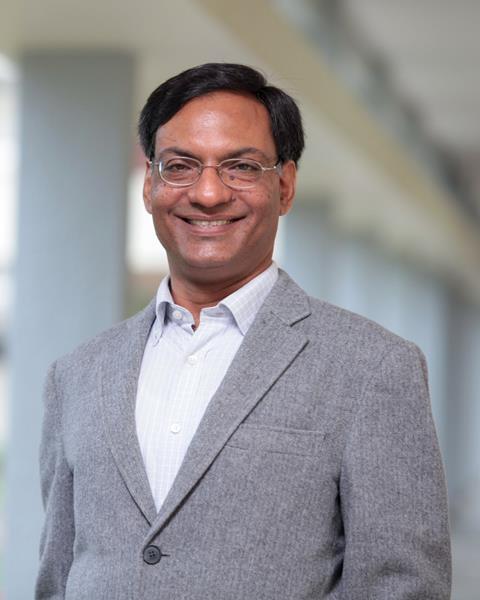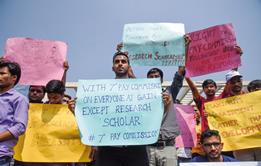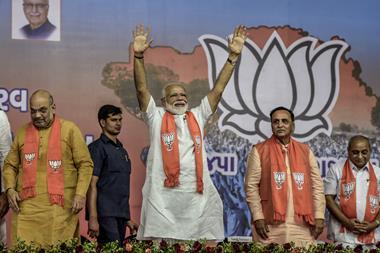Science secretary Ashutosh Sharma on how to fix India’s PhD pipeline
There has been recent criticism of India’s PhD culture, with many doctoral gradautes unable to find work in academia despite participating in national schemes such as the Inspire programme. Chemistry World put students’ concerns to Ashutosh Sharma, secretary of India’s Department of Science & Technology.
Most PhD students in India want to pursue a career in academia. Does this need to change?
It is a pervasive culture among PhD students to prepare for and focus narrowly on jobs in academia and government-funded R&D labs. India’s education until PhD doesn’t really encourage sufficient independent thinking to inspire the confidence needed for profound and disruptive ideas.
Our R&D ecosystem has, historically, focused on basic sciences. While this is certainly an important part of a vibrant and robust knowledge ecosystem, the emphasis on relevant applied sciences has been less than optimal, and much less than would be desirable. There are cultural and structural dimensions to this problem. For example, there is this myth about translational sciences being not as intellectually stimulating as the so-called fundamental sciences. However, this is now changing with opening up of large opportunities in industry, design and R&D companies in catalysis, materials, data sciences, pharma, environment, water, transport and energy.
Doctoral research is not only about the contents of the research but also to teach research processes
The onus on changing this pervasive mindset is not only with the students, but must come from all stakeholders – educational and R&D institutions, teachers and mentors. We should encourage independent and critical thinking among students, and train them to relate to larger concerns about science and society through their work. A PhD cannot be straitjacketed as a vehicle only for publishing papers in scientific journals. The doctoral experience is not only about the contents of the research area, which is often narrowly defined, but also to teach research processes so as to prepare a researcher for a lifelong career responsive to changing needs and opportunities. A holistic research education should be able to explain the usefulness of the science being done and its potential impact on our lives.

We have launched an initiative, Augmenting Writing Skills for Articulating Research, which encourages and rewards PhD scholars and postdocs to write at least one popular science article about their research. We also introduced a national postdoctoral fellowship about two years ago. It is meant to develop a postdoctoral ecosystem in India, which was largely non-existent. We are currently supporting around 2500 post-doctoral fellowships, and plan to provide another 500 fellowships every year. The idea is to create scientific leadership in our institutions and provide opportunities for the best of our
PhD graduates to prepare for a career in academia and R&D.
Finally, we have set up a committee on how to improve the quality of PhD education. The committee will explore the ways and means of enhancing the value and experience of completing a PhD.
Is the Inspire programme doing enough to help postdocs get permanent jobs?
The Indian government provides tens of thousands of attractive scholarships and fellowships at all stages, from undergraduate education to postdoctoral research. The idea is to provide appropriate support to acquire experience and skills until a clear career choice – academia, R&D labs, industry or entrepreneurship – is made. Postdoctoral fellowships offer an opportunity to further enhance one’s research experience and CV in preparation for a job.
Students don’t lack the necessary knowledge - they lack confidence
Globally, perhaps only 10% of PhD graduates find jobs in top-flight universities. In comparison, as many as 70% of the Inspire and Ramanujan fellows [for those returning abroad to India] have academic jobs. Some areas, such as biosciences and life sciences, have greater competition owing to a larger number of PhDs. Thus, our PhD and postdoc training needs to focus on the other sectors of employment. Clearly, one size doesn’t fit all.
Training during a PhD in fundamental science should strongly encourage quality by focusing on profound rather than on incremental research. PhDs in applied sciences and engineering should focus on problem-centric rather than tool-centric approaches. An early emphasis on innovation and problem-solving will lead to creation of huge new employment opportunities. In my own experience, as many as 30% of our PhDs from IITs are now ready to take a plunge in setting up start-ups. These students don’t lack the necessary knowledge – they lack the confidence required to overcome their fear of failure. Our institutions are increasingly addressing this cultural dimension, together with support from the government.
Should the number of PhD students in India be capped?
I’m comfortable with current PhD numbers. India compares favourably globally with the top R&D spending nations when you consider our investment on a per scientist basis, corrected by the Purchase Power Parity index. Today, India’s federal and state governments support more than 80,000 PhDs in science and technology. This is not a large number for a country the size of India! Further, the global footprint of R&D is expanding rapidly, and India is increasingly seen as a preferred destination. This, coupled with the greater emphasis of Indian industry on R&D for its own vast market, is a welcome sign that indicates a bright future for research.
The brightest and the best of India’s PhD graduates should not remain mere job seekers, but use their knowledge to address new challenges. This will create new opportunities and many more jobs. This is already happening in a more systemic manner, for example at the Deep Technology Incubator at IIT Delhi, and many similar initiatives are getting ready for huge scale-up. The future of PhD research in India looks brighter than ever.
India’s doctorate dilemma

Why thousands of PhD chemists in India are without a permanent position
- 1
 Currently
reading
Currently
reading
'India doesn't encourage PhD students to think independently'















No comments yet